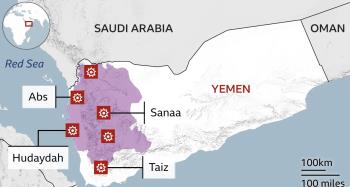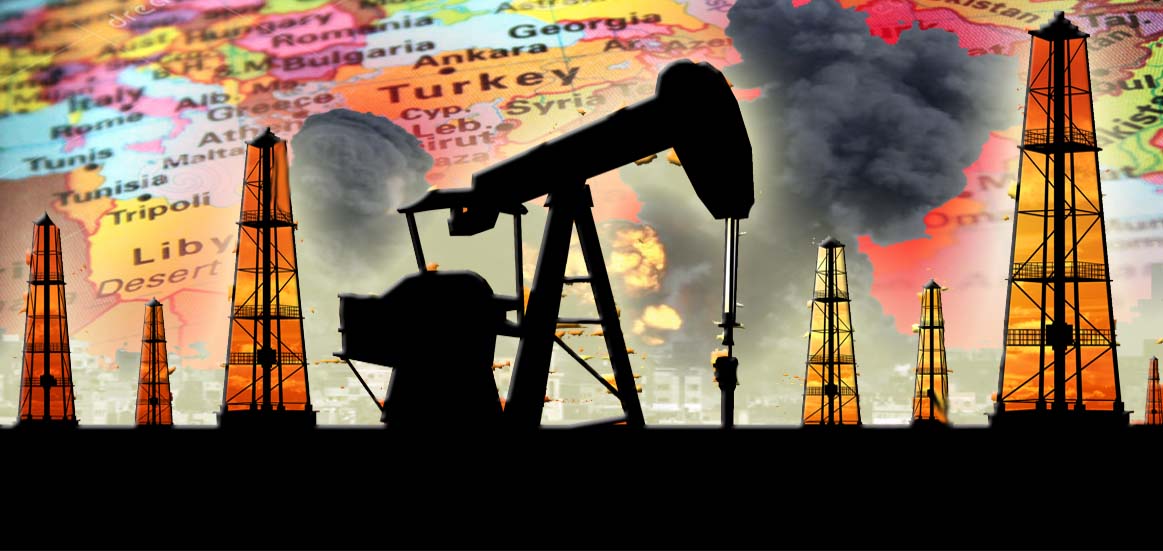Alwaght- Middle Eastern natural resources, mainly oil and gas, has captivated global powers since the early twentieth century. Its attraction has been powerful for western countries, in particular the U.S. The American passion for MidEastern oil and gas began in earnest in the thirties of the twentieth century, when geologists working for Standard Oil of California discovered commercial quantities of oil on the eastern shores of Saudi Arabia. In the years that followed, enchantment turned into obsession. Shortly after World War II it became clear that oil was more than merely a coveted industrial commodity. The most visible and celebrated event in that history occurred when the American president Roosevelt hosted ‘Abd al-‘Aziz Ibn Saud, the founding monarch of Saudi Arabia, aboard the USS Quincy on Egypt’s Great Bitter Lake in February 1945. The meeting permanently linked Middle Eastern oil with American national security. It also helped forge one of the twentieth century’s most important strategic relationships, in which the Saudis would supply cheap oil to global markets in exchange for American protection.
Over the course of the twentieth century, preserving the security not just of Saudi Arabia but also of the entire Persian Gulf region and the flow of Middle Eastern oil were among the United States’ chief political-economic concerns.
The U.S.-led invasion of Iraq in 2003 and the American military occupation there represents one of the stages of American militarism in the Middle East.
Before the 2003 invasion, Iraq's domestic oil industry was fully nationalized and closed to Western oil companies. A decade of war later, it is largely privatized and utterly dominated by foreign firms. Oil was not the only goal of the Iraq War, but it was certainly the central one, as top U.S. military and political figures have confirmed in the years following the invasion. Top Republican leaders in the American administration say that the Iraq invasion was for oil. U.S. Secretary of Defense – and former 12-year Republican Senator – Chuck Hagel said of the Iraq war in 2007: “People say we’re not fighting for oil. Of course we are. They talk about America’s national interest. What the hell do you think they’re talking about? We’re not there for figs.” Moreover, four Star General John Abizaid, the former commander of CENTCOM with responsibility for Iraq said “Of course it’s about oil, it’s very much about oil, and we can’t really deny that.” The key war architect and Under Secretary of State John Bolton said: “The critical oil and natural gas producing region that we fought so many wars to try and protectour economy from the adverse impact of losing that supply or having it available only at very high prices.”
The United States remains a prisoner of its energy dilemma’, and that one of the ‘consequences’ of this is a ‘need for military intervention’. All five permanent members of the UN Security Council — the UK, France, China, Russia and the US — have international oil companies that were seeking benefit from huge windfalls in the event of regime change in Baghdad. The best chance for US firms to make billions would come if Bush would have installed a pro-US Iraqi opposition member as the head of a new government.
Representatives of foreign oil firms met with leaders of the Iraqi opposition. Ahmed Chalabi, the London-based leader of the Iraqi National Congress, said: “American companies will have a big shot at Iraqi oil.”
Indeed, top oil economists have said that the Iraq war substantially raised the price of oil, making a lot of people rich. As bizarre as the oil-restriction theory may sound, the big U.S. oil companies have been doing that kind of stuff for years.
The irrationality and unscrupulousness of the approaches Western countries have taken to the Syrian crisis, when the same people who in Europe are considered terrorists are declared «freedom fighters» when it comes to Syria, becomes clearer in light of the economic dimension of the Syrian tragedy. There is every reason to think that by helping destroy its own cultural and historical roots in Syria, Europe is first and foremost fighting for energy resources. And a special role is played by natural gas, which is emerging as the main fuel of the 21st century. The geopolitical problems connected with its production, transportation and use are perhaps more than any other topic on the radar of Western strategists.
In the fitting expression of F. William Engdahl, “Natural gas is the flammable ingredient that is fueling this insane scramble for energy in the region.” A battle is raging over whether pipelines will go toward Europe from east to west, from Iran and Iraq to the Mediterranean coast of Syria, or take a more northbound route from Qatar and Saudi Arabia via Syria and Turkey. Having realized that the stalled Nabucco pipeline, and indeed the entire Southern Corridor, are backed up only by Azerbaijan’s reserves and can never equal Russian supplies to Europe or thwart the construction of the South Stream, the West is in a hurry to replace them with resources from the Persian Gulf. Syria ends up being a key link in this chain, and it leans in favor of Iran and Russia; thus, it was decided in the Western capitals that Syrian regime needs to change. The fight for «democracy» is a false flag thrown out to cover up very different aims.
The Security threat to the Strait of Bab el Mandeb represents a real danger to the world’s trade flows, especially oil trade. The closure of the strait could hamper the arrival of oil tankers from the Persian Gulf to the Suez Canal, which will increases the likelihood of disabling the arrival of oil supplies from Persian Gulf states. Since these states are a major oil-exporting countries globally, in this case it is possible of course that oil prices will witness sharp rises. International assessments estimate that all the global supply of oil cuts about one million barrels per day, will increase the price of oil more than $ 5.2 per barrel. This increase represents a real threat to the western countries.
Today the US-backed wars in Ukraine and in Syria are but two fronts in the same strategic war to cripple Russia and China and to rupture any Eurasian counter-pole to a US-controlled New World Order. In each, control of energy pipelines, this time primarily of natural gas pipelines—from Russia to the EU via Ukraine and from Iran and Syria to the EU via Syria—is the strategic goal. The true aim of the US and Israel backed ISIS is to give the pretext for bombing Assad’s vital grain silos and oil refineries to cripple the economy in preparation for a “Ghaddafi-”style elimination of Russia and China and Iran-ally Bashar al-Assad.
In a narrow sense, as Washington neo-conservatives see it, who controls Syria could control the Middle East. And from Syria, gateway to Asia, he will hold the key to Russia House, as well as that of China via the Silk Road.



























